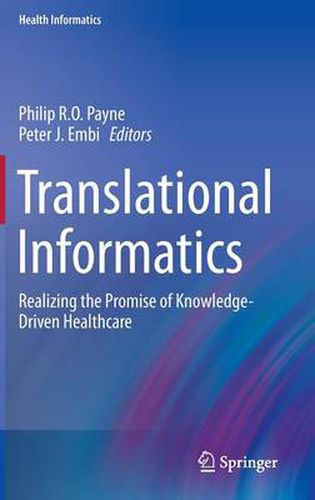Readings Newsletter
Become a Readings Member to make your shopping experience even easier.
Sign in or sign up for free!
You’re not far away from qualifying for FREE standard shipping within Australia
You’ve qualified for FREE standard shipping within Australia
The cart is loading…






This title is printed to order. This book may have been self-published. If so, we cannot guarantee the quality of the content. In the main most books will have gone through the editing process however some may not. We therefore suggest that you be aware of this before ordering this book. If in doubt check either the author or publisher’s details as we are unable to accept any returns unless they are faulty. Please contact us if you have any questions.
Integrative and translational methodologies and frameworks have transformed modern biomedical research and the delivery of clinical care. This shift has been manifested in a number of ways, including the rapid growth and increasing availability of high-throughput bio-molecular instrumentation and analysis platforms, innovative clinical research programs intended to accelerate knowledge translation, and initial efforts to deliver personalized healthcare informed by the genomic profiles of patients. A common theme of reports and publications concerned with such transformative changes in the biomedical and healthcare domains is concerned with the challenges and opportunities related to the collection, management, integration, analysis, and dissemination of large-scale, heterogeneous biomedical data sets. In particular, the absence of well-established and adopted theoretical and practical frameworks intended to address such needs is a major impediment to the realization of translational and knowledge-driven healthcare, in which the best possible scientific evidence is used to inform the care of every patient. In this vacuum, the development of integrative clinical or translational research paradigms is significantly limited by the propagation of both data and expertise silos. This book details for the first time the current state of this extremely potent area of healthcare innovation and policy and defines the interaction between clinical/translational science and biomedical informatics.
$9.00 standard shipping within Australia
FREE standard shipping within Australia for orders over $100.00
Express & International shipping calculated at checkout
This title is printed to order. This book may have been self-published. If so, we cannot guarantee the quality of the content. In the main most books will have gone through the editing process however some may not. We therefore suggest that you be aware of this before ordering this book. If in doubt check either the author or publisher’s details as we are unable to accept any returns unless they are faulty. Please contact us if you have any questions.
Integrative and translational methodologies and frameworks have transformed modern biomedical research and the delivery of clinical care. This shift has been manifested in a number of ways, including the rapid growth and increasing availability of high-throughput bio-molecular instrumentation and analysis platforms, innovative clinical research programs intended to accelerate knowledge translation, and initial efforts to deliver personalized healthcare informed by the genomic profiles of patients. A common theme of reports and publications concerned with such transformative changes in the biomedical and healthcare domains is concerned with the challenges and opportunities related to the collection, management, integration, analysis, and dissemination of large-scale, heterogeneous biomedical data sets. In particular, the absence of well-established and adopted theoretical and practical frameworks intended to address such needs is a major impediment to the realization of translational and knowledge-driven healthcare, in which the best possible scientific evidence is used to inform the care of every patient. In this vacuum, the development of integrative clinical or translational research paradigms is significantly limited by the propagation of both data and expertise silos. This book details for the first time the current state of this extremely potent area of healthcare innovation and policy and defines the interaction between clinical/translational science and biomedical informatics.